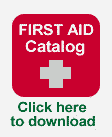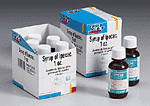 |
Toll Free 1 (800) 480-1277 |
Loading
|
|

![]()
First Aid Kits:
We have a selection of many different first
aid kits for schools, Industrial
settings, Businesses, Emergencies, CPR, etc...

What is Ipecac Syrup?
Ipecac syrup is a medicine that causes vomiting. In the past it was used to partially empty a person's stomach after a poison. It is now rarely recommended. It is NOT necessary to keep ipecac syrup in your home. In case of poisoning, call the poison center right away at 1-800-222-1222. What Happened to Ipecac Syrup? For years, parents were told to keep ipecac syrup at home. This medicine could be used to make a child vomit after swallowing poison. Now, your doctor doesn't tell you to keep it. The poison center doesn't tell you to use it. You can't even buy ipecac in the drugstore. What happened? And NOW what should you do? The short story: Call the poison center right away at 1-800-222-1222 if you think someone has been poisoned. If the poison was swallowed, breathed in, or splashed on someone's skin or eyes, the poison center experts will tell you what to do right away. Local experts will answer your phone call, 24 hours a day, 7 days a week. Most of the time, you can stay safely at home with the poison center's advice. But, be prepared:. The longer story: It seemed to make sense. If someone swallowed poison and then threw up, they shouldn't get sick. This treatment approach was used for decades. At first, people who swallowed poison were given many ineffective remedies: raw egg white; mustard; the "universal antidote" of burnt toast, tannic acid and milk of magnesia; salt water; tickling the back of the throat. Sometimes, these remedies did cause vomiting. But they often caused problems of their own. For example, too much salt caused sodium poisoning, seizures and even death. Gagging someone often caused throat bleeding and swelling. Also, these home remedies were never reliable enough to be used to treat poisoning. And complicated charts about what remedy went with what poisoning were confusing. Small brown bottles of ipecac syrup seemed to solve these problems. When given to children or adults, ipecac made most of them throw up within 20-30 minutes. Since at least the 1960's, standard parenting advice included keeping a bottle of ipecac syrup at home. In fact, many pediatricians and health clinics gave ipecac to parents, "just in case". What we know now: It turns out that a big piece of the picture was missing. Yes, ipecac made people throw up, whether or not they swallowed poison. But did throwing up keep them from actually getting sick from the poison? Recently, researchers looked at all of the evidence about ipecac syrup. They agreed that ipecac syrup reliably caused vomiting. They also agreed that this didn't make any difference! In other words, there was little research to show that people who swallowed ipecac after poisoning did any better than others. In addition, this review highlighted some problems with ipecac: There are times when ipecac is unsafe. It shouldn't be given to someone who swallowed chemicals that cause burns on contact or medicines that can cause seizures very quickly. It can be dangerous to people with some types of medical problems. When such poisoning victims got ipecac anyway, they developed serious complications or even died. More and more people with eating disorders were using ipecac to make themselves throw up. Regular use of ipecac syrup is dangerous; for example, chronic users have died from heart problems. Sometimes people vomiting after ipecac could not keep down other drugs they needed to treat their poisonings. Based on these facts, pediatricians, poison centers, and federal regulators have re-evaluated the use of ipecac. Follow the links at the end for the fine print. Should you keep ipecac at home? The American Academy of Pediatrics recommends that ipecac syrup NOT be stocked at home. Likewise, the American Association of Poison Control Centers no longer recommends that parents keep ipecac syrup at home. The U.S. Food and Drug Administration is considering a recommendation from one of its expert panels to make ipecac syrup a prescription-only drug. To date, FDA has not acted on the panel recommendation. In the Washington, DC metropolitan area, the National Capital Poison Center does not recommend that parents stock ipecac syrup at home. In fact, most pharmacies no longer stock ipecac syrup. I hear about activated charcoal.Activated charcoal is a medicine that is used to treat some serious poisonings. It is often given in emergency departments and sometimes, but rarely, at home. The National Capital Poison Center does NOT recommend that parents keep activated charcoal at home. It goes back to research. Most studies do not show a benefit to keeping and giving activated charcoal at home. The bottom line: Parents, child care providers, and everyone who spends time with children should post the poison center phone number on or near every phone. Call 1-800-222-1222 right away for a possible poisoning. Trained experts will guide you: if treatment is needed, they'll tell you what to do. They will call you back to be sure that everything is all right. For more information:
Syrup
of ipecac (derived from the Ipecacuanha plant), is an emetic - a substance
used to induce vomiting. Home - Industrial Products - Miscellaneus Index
|
||||||||














